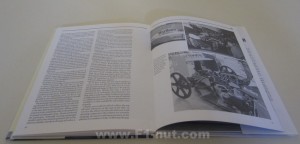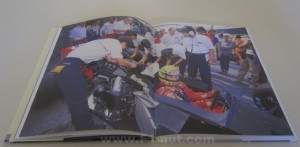
Book Review: McLaren Honda Turbo by Ian Bamsey
Positives
Negatives
The question on everyone’s lips is whether McLaren and Honda can re-live the glory years of their previous partnership in the late 80’s/early 90s or whether it will be a repeat of Honda’s own fizzer in 2007-2008 as a works team. Ian Bamsey of Racecar Engineering is one of the authors of a series of […]
The question on everyone’s lips is whether McLaren and Honda can re-live the glory years of their previous partnership in the late 80’s/early 90s or whether it will be a repeat of Honda’s own fizzer in 2007-2008 as a works team. Ian Bamsey of Racecar Engineering is one of the authors of a series of “Technical Appraisal” books on various famous grand prix cars (Vanwall 2.5, Lotus 25 & Auto Union V16) published by Haynes/Foulis in the 90s. His book “McLaren Honda Turbo” is one of the few dedicated technical books I know of documenting the technical marriage of the MP4/4 chassis and Honda’s RA168E engine.
While only 96 pages long, this book isn’t a compilation of material from other books and Autocourse – Bamsey was provided lots of actual technical information from Honda engineer Osamu Goto and the McLaren team.
There are only a few chapters – “Origins” gives the reader a little background to the development of the F1 turbo charged engines starting from Renault to Cosworth to Ferrari to BMW. “Running on Empty” is probably the most hard core technical chapter which goes into heavy detail on the valve angle, engine management, power curves, fuel mix, fuel consumption, temperature. “Low Line” details the BT55 inspired low profile monocoque, side pods, suspension, rear and front wing design philosophy. The final “Blockbuster” chapter traces the pre-season testing of the MP4/4 and compares to the Lotus and Ferrari turbos.
Photography-wise there are only a dozen nice double page color photos of the MP4/4 in action, the rest of the photography is somewhat grainy B&W shots of the MP4/4 and Honda engine from various angles and in the garage.
Within each of the chapters is also a running diary of the 1988 season and the qualifying and race positions of Senna and Prost. In the actual chapters themselves, Bamsey captures how the behind the scenes strategy with engine settings and fuel mixes, etc. reflected in the actual race result. This includes the various problems Prost (clutch at Suzuka) and Senna (gear selection at Imola & Paul Ricard) encountered at each of the races. Also each of the chassis numbers are traced.
This is a recommended read for the F1 technical fan.
Wow Factor/Money Shot: Lots of actual RA168E power curve charts if you’re a F1 engineering tech head.
Suitable for: F1 tech heads or historians











Shame he didnt speak to the actual designer of the car Steve Nichols and the design team. A very bad error for anyone who wnats to talk about the Mclaren 4/4
It was not designed by Gordon Murray who was head of technical and not part of the design team. The car was not based on the Brabham BT55 which was a very bad car but was an evolution of the MP4/3
yes, in this respect Haynes’ McLaren MP4/4 Owners Manual has this perspective better nailed (the Haynes manual is also a better book too, as Ian Bamsey’s book is dated)